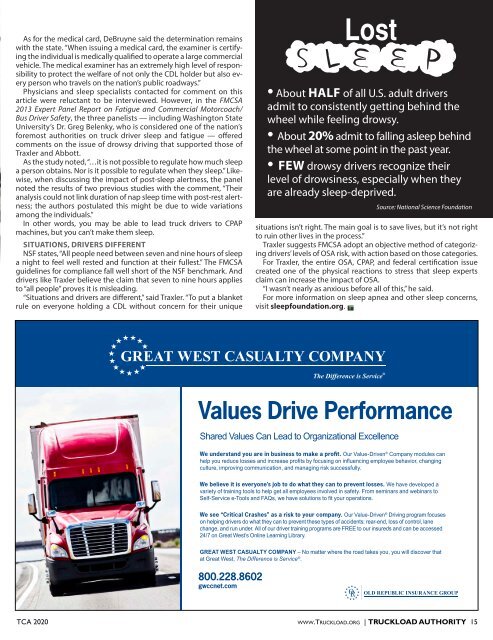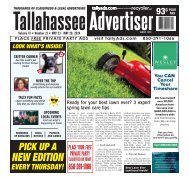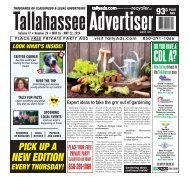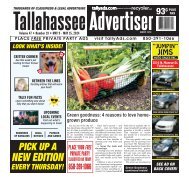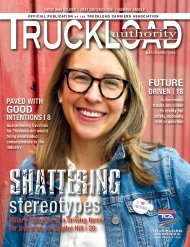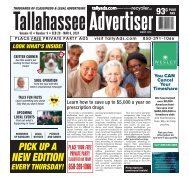TLA42_AllPages
You also want an ePaper? Increase the reach of your titles
YUMPU automatically turns print PDFs into web optimized ePapers that Google loves.
As for the medical card, DeBruyne said the determination remains<br />
with the state. “When issuing a medical card, the examiner is certifying<br />
the individual is medically qualified to operate a large commercial<br />
vehicle. The medical examiner has an extremely high level of responsibility<br />
to protect the welfare of not only the CDL holder but also every<br />
person who travels on the nation’s public roadways.”<br />
Physicians and sleep specialists contacted for comment on this<br />
article were reluctant to be interviewed. However, in the FMCSA<br />
2013 Expert Panel Report on Fatigue and Commercial Motorcoach/<br />
Bus Driver Safety, the three panelists — including Washington State<br />
University’s Dr. Greg Belenky, who is considered one of the nation’s<br />
foremost authorities on truck driver sleep and fatigue — offered<br />
comments on the issue of drowsy driving that supported those of<br />
Traxler and Abbott.<br />
As the study noted, “…it is not possible to regulate how much sleep<br />
a person obtains. Nor is it possible to regulate when they sleep.” Likewise,<br />
when discussing the impact of post-sleep alertness, the panel<br />
noted the results of two previous studies with the comment, “Their<br />
analysis could not link duration of nap sleep time with post-rest alertness;<br />
the authors postulated this might be due to wide variations<br />
among the individuals.”<br />
In other words, you may be able to lead truck drivers to CPAP<br />
machines, but you can’t make them sleep.<br />
SITUATIONS, DRIVERS DIFFERENT<br />
NSF states, “All people need between seven and nine hours of sleep<br />
a night to feel well rested and function at their fullest.” The FMCSA<br />
guidelines for compliance fall well short of the NSF benchmark. And<br />
drivers like Traxler believe the claim that seven to nine hours applies<br />
to “all people” proves it is misleading.<br />
“Situations and drivers are different,” said Traxler. “To put a blanket<br />
rule on everyone holding a CDL without concern for their unique<br />
Lost<br />
sleep<br />
• About HALF of all U.S. adult drivers<br />
admit to consistently getting behind the<br />
wheel while feeling drowsy.<br />
• About 20% admit to falling asleep behind<br />
the wheel at some point in the past year.<br />
• FEW drowsy drivers recognize their<br />
level of drowsiness, especially when they<br />
are already sleep-deprived.<br />
Source: National Science Foundation<br />
situations isn’t right. The main goal is to save lives, but it’s not right<br />
to ruin other lives in the process.”<br />
Traxler suggests FMCSA adopt an objective method of categorizing<br />
drivers’ levels of OSA risk, with action based on those categories.<br />
For Traxler, the entire OSA, CPAP, and federal certification issue<br />
created one of the physical reactions to stress that sleep experts<br />
claim can increase the impact of OSA.<br />
“I wasn’t nearly as anxious before all of this,” he said.<br />
For more information on sleep apnea and other sleep concerns,<br />
visit sleepfoundation.org.<br />
Values Drive Performance<br />
Shared Values Can Lead to Organizational Excellence<br />
We understand you are in business to make a profit. Our Value-Driven ® Company modules can<br />
help you reduce losses and increase profits by focusing on influencing employee behavior, changing<br />
culture, improving communication, and managing risk successfully.<br />
We believe it is everyone’s job to do what they can to prevent losses. We have developed a<br />
variety of training tools to help get all employees involved in safety. From seminars and webinars to<br />
Self-Service e-Tools and FAQs, we have solutions to fit your operations.<br />
We see “Critical Crashes” as a risk to your company. Our Value-Driven ® Driving program focuses<br />
on helping drivers do what they can to prevent these types of accidents: rear-end, loss of control, lane<br />
change, and run under. All of our driver training programs are FREE to our insureds and can be accessed<br />
24/7 on Great West’s Online Learning Library.<br />
GREAT WEST CASUALTY COMPANY – No matter where the road takes you, you will discover that<br />
at Great West, The Difference is Service ® .<br />
800.228.8602<br />
gwccnet.com<br />
TCA 2020 www.Truckload.org | TRUCKLOAD AUTHORITY 15


